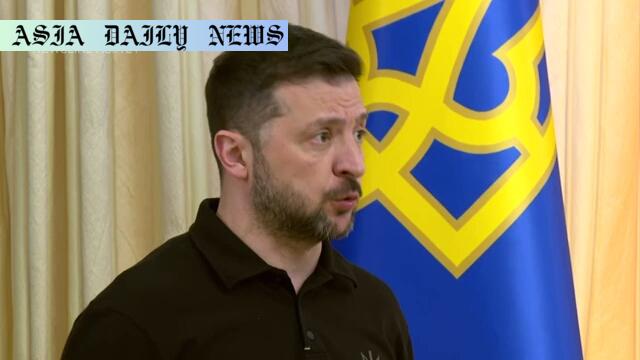Zelenskyy refuses US-proposed recognition of Russia’s annexed Crimea and firmly negates NATO exclusion for Ukraine.
Zelenskyy denies receiving an official US peace proposal.
Proposals reportedly include recognizing Crimea as Russian.
Ukraine opposes NATO exclusion and demands a just peace.

Zelenskyy Denies US Peace Proposal
Ukrainian President Volodymyr Zelenskyy has unequivocally stated that he has not received any official peace proposal from the United States regarding the ongoing war with Russia. Addressing media reports, Zelenskyy dismissed allegations that Washington had suggested a plan which includes controversial conditions such as recognizing Russia’s annexation of Crimea and barring Ukraine from NATO membership. This statement reinforces Ukraine’s position that any peace settlement must adhere to international laws and respect its sovereignty.
Ukraine’s Stand on Crimea
One of the critical points in the alleged peace plan is the recognition of Russia’s unilateral annexation of Crimea, a move that Ukraine has repeatedly denounced. Zelenskyy made it clear during his press conference that Ukraine will never recognize Russian control over Crimea, which was seized in 2014. According to Zelenskyy, accepting such terms would erode the country’s territorial integrity and undermine international norms, setting a dangerous precedent for other conflicts worldwide.
NATO Membership: A Non-Negotiable Factor
The United States’ reported exclusion of Ukraine from NATO has added an additional layer of complexity to the ongoing discourse. President Zelenskyy has maintained that joining NATO is essential for Ukraine’s long-term stability and security. He views this as critical leverage against further Russian aggression. Zelenskyy emphasized that Ukraine’s aspirations for NATO membership must not be compromised in any potential peace negotiations, as this would leave the country vulnerable to future threats.
Desire for a Fair and Swift Peace
Despite rejecting the alleged proposals, Zelenskyy has repeatedly voiced his support for a swift, fair, and just resolution to the conflict. He suggested that an unconditional ceasefire should serve as the first step towards achieving lasting peace. Zelenskyy believes that any peace agreement must prioritize Ukraine’s sovereignty and the protection of its citizens over geopolitical expediency. This aligns with the country’s broader strategic goal of European integration and lasting security guarantees.
Broader Implications for International Diplomacy
The alleged US proposals and Ukraine’s firm stance highlight the delicate balance global powers must navigate in conflict resolution. The discourse surrounding Crimea and NATO underscores how regional disputes can carry far-reaching implications for international law, alliances, and power dynamics. Ukraine’s resistance to what it perceives as unjust terms serves as a reminder that sustainable peace cannot be achieved through concessions that violate national sovereignty or undermine democratic values.
The Path Forward
Ukraine remains steadfast in its pursuit of justice and sovereignty, drawing support from its allies. As the situation develops, the international community will undoubtedly continue to play a central role in mediating discussions and reaching a resolution that aligns with both ethical principles and practical realities. Zelenskyy’s firm stance reflects a broader commitment to uphold the values of freedom, self-determination, and rule of law in the face of escalating pressures.



Commentary
Zelenskyy’s Stance: A Reflection of Ukraine’s Sovereignty
Zelenskyy’s outright dismissal of the unconfirmed US peace proposal reinforces his dedication to protecting Ukraine’s national interests. Recognizing Crimea as Russian territory or excluding Ukraine from NATO would be a direct affront to the sovereignty and future security of Ukraine. His defiance in the face of such alleged proposals highlights his unwavering commitment to uphold the territorial integrity and rights of his nation. This principled stance should remind global leaders of the importance of fairness and justice in international negotiations.
The Global Implications of Crimea
At the core of this discussion lies an issue far greater than Ukraine: the precedent that any recognition of Crimea as Russian territory would set. It could potentially embolden aggressive annexations globally, undermining international law and destabilizing regions worldwide. Zelenskyy’s refusal to concede Crimea is not only about nationalism; it is about enforcing the rules-based international order that governs modern global relations. This is why his steadfastness deserves broader support beyond just Ukraine’s allies.
The NATO Debate: Why It Matters
Ukraine’s push for NATO membership also reflects the country’s long-term strategy to ensure future stability. NATO plays a critical role in securing its member states from external threats, and Ukraine’s inclusion would signal a united European front against aggression. As Zelenskyy rightfully points out, abandoning NATO aspirations would leave Ukraine exposed to recurring threats from Russia, a situation that is unacceptable for any sovereign state seeking peace and security.
Lessons for Diplomacy Around the World
The alleged US peace proposal, if true, sheds light on the moral dilemmas of large-scale geopolitics. Quick solutions to end conflicts must not come at the expense of fairness and international law. Zelenskyy’s insistence on justice serves as a reminder that sustainable peace can only be achieved through equitable negotiations and mutual respect between parties. The international community has a moral responsibility to ensure that smaller nations like Ukraine are not pressured into unjust settlements for the sake of convenience.
In conclusion, Zelenskyy’s rejection of alleged proposals that compromise Ukraine’s sovereignty is a testament to his resilience and leadership. His stance sends a clear message: that peace cannot be achieved through capitulation but must be built on principles of justice, equality, and respect for international norms. It is a lesson that global powers must heed as they work towards resolving conflicts in an increasingly complex world.